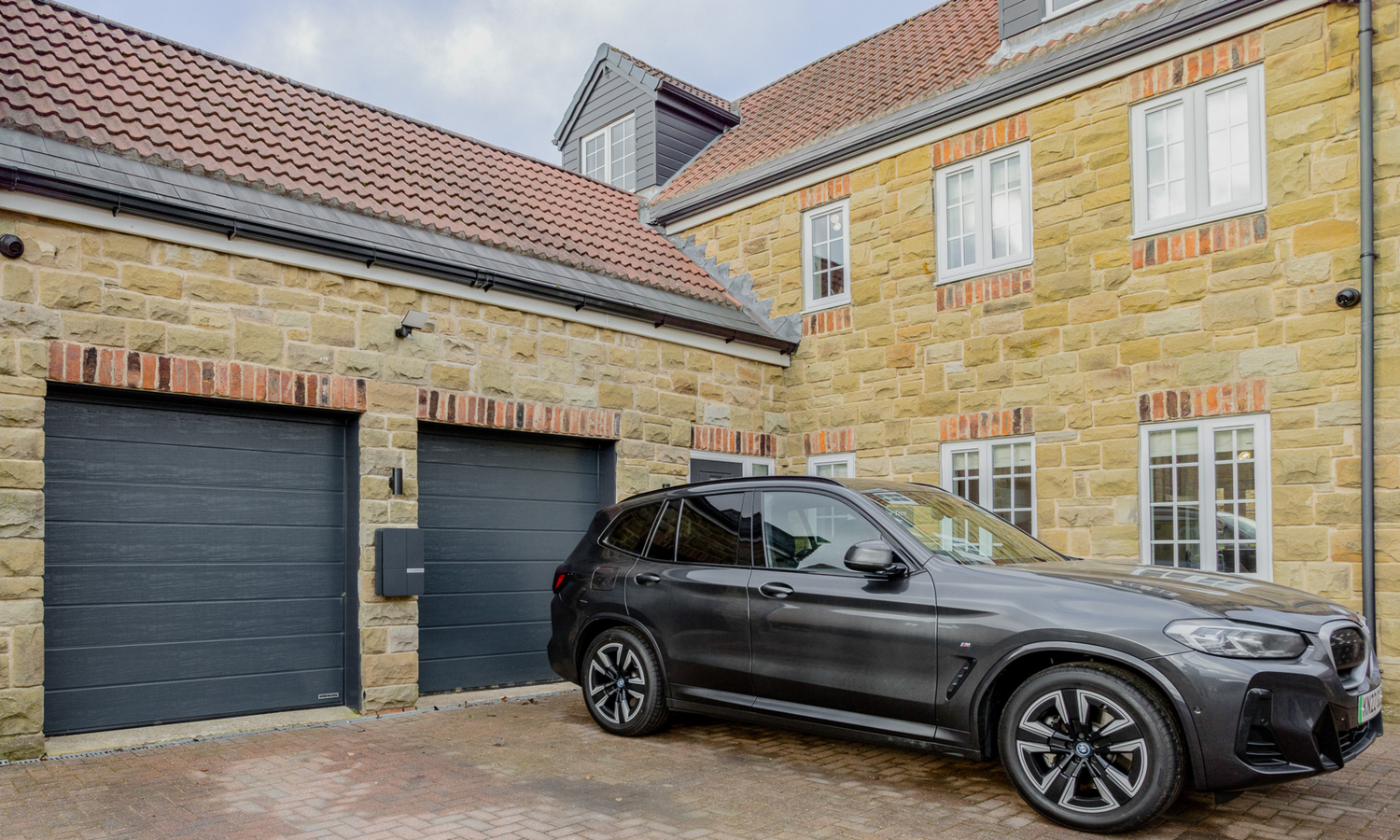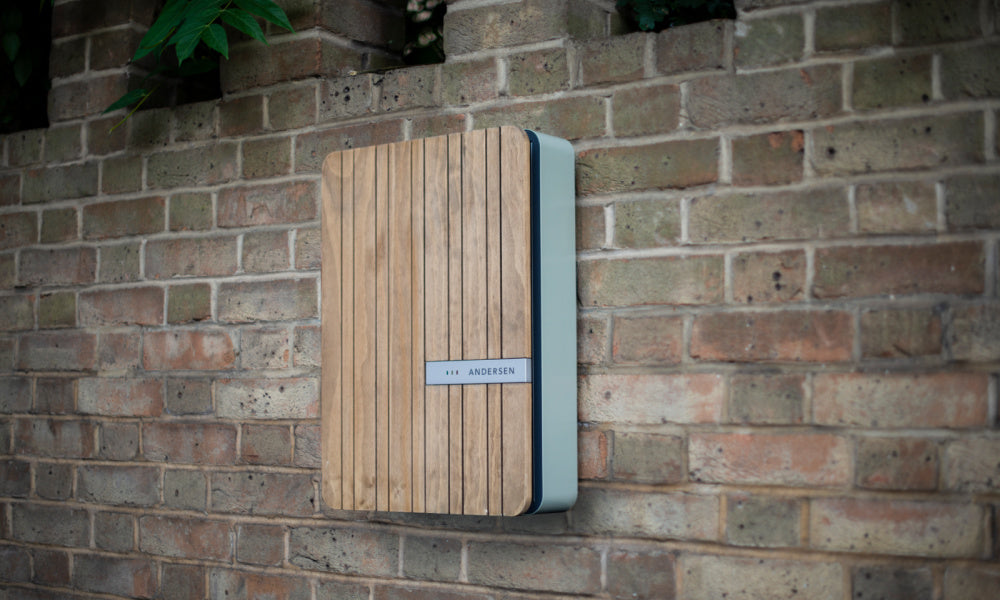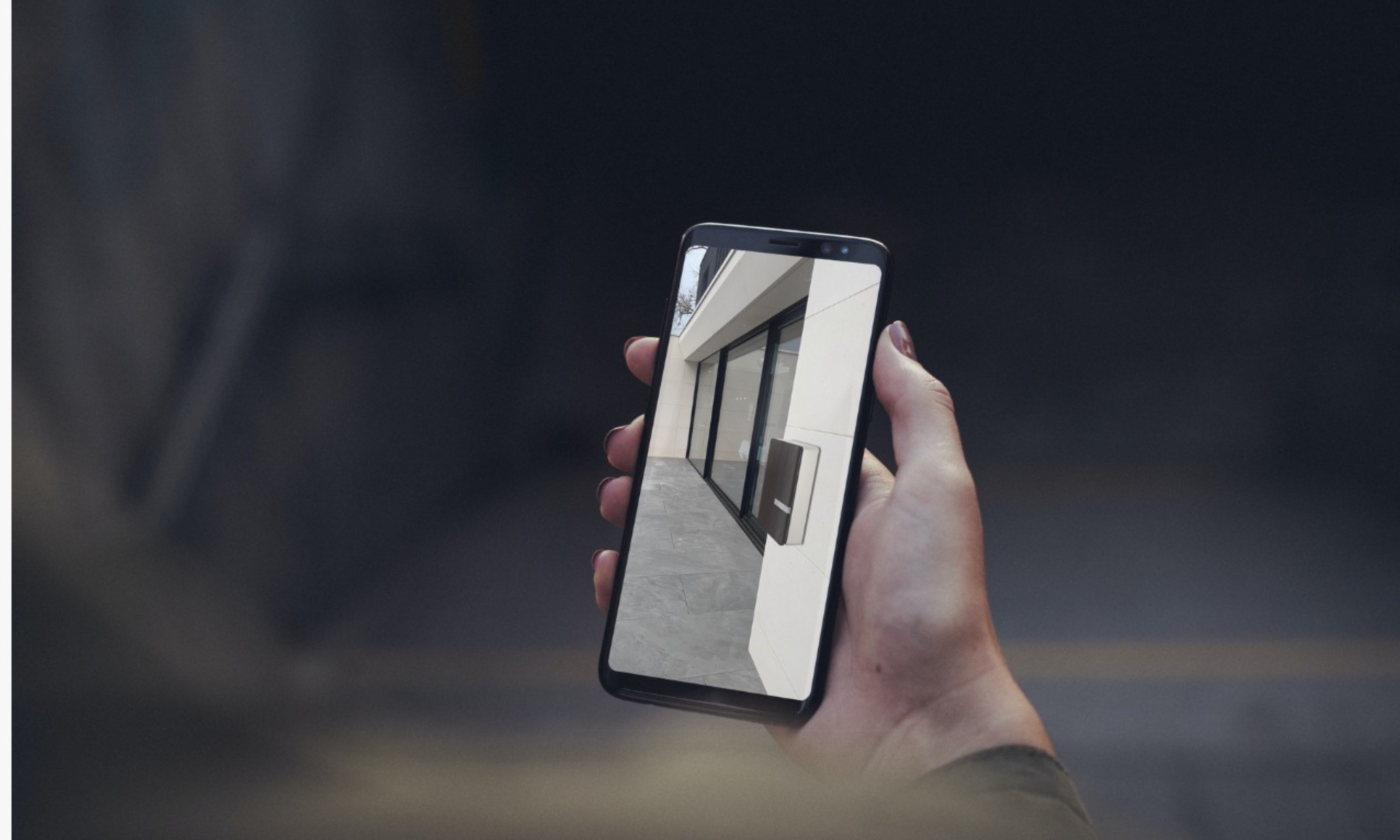If you’re thinking about buying an electric vehicle, then you don’t just need to decide what model car you would like. You also need to decide whether you want to install an EV charger at home. If that’s a decision you’re dealing with at the moment, then keep reading and the Andersen EV team will take you through the benefits of installing a home EV charger…
What is a home EV charger?
Firstly, let’s kick things off with a definition. What exactly is a home EV charger?
The obvious answer is that it’s an appliance which can be used to charge your electric vehicle when it’s parked at your home.
However, as we’ve written recently, there is a distinct difference between EV chargers for the home, and the types of chargers you’ll find at motorway service stations and other commercial EV charging facilities.

As such, it’s important that you select an EV charger for your home that has the correct power output, has the correct plug type, is compatible with your car, has smart features and more.
Once you start looking into home EV chargers, you’ll find that there’s a lot more to think about than you may have initially realised. That’s why we’ve written a complete guide to buying an EV charger for your home that covers everything you need to know.
The benefits of installing a home EV charger
Any purchase over a certain amount of money requires thought and consideration. However, as you’re about to read, a home EV charger is certainly a worthwhile investment. As you’ll see, the benefits associated with EV chargers stretch far beyond the immediate ones.
Convenience
Perhaps the most immediate benefit of installing an EV charger at home is the sheer convenience associated with home charging.
As you may have read in the news of late, and as reported by motoring body the RAC, the lack of commercial EV charging points is leading to drivers queuing for three or more hours to charge their vehicles.
That’s not exactly the best use of time.
By installing a charger at your home, you can avoid these charging woes and leave the house every morning with a fully charged car.
Here at Andersen EV, our A2 home charger is available with various power outputs, including 7kW and 22kW.
If you have a single-phase electricity connection at your home (and most UK homes do), then you’ll be able to install a 7kW Andersen A2 charging point.
Should you own a car such as a Porsche Taycan with a battery capacity of 79.2 kWh, then you’ll be able to completely charge your car (from ‘empty’ to ‘full’), in a little over 11 and a half hours. That’s as simple as plugging your car in when you return home from work and unplugging it when you leave the next morning.
Bear in mind, however, that the above scenario is exceptionally rare. Approximately 99% of journeys are under 100 miles, so electric vehicles very rarely find their battery charge going down to single figure percentages. It’s far more often the case that you simply need to ‘top up’ your vehicle for a few hours.
With a charger at home this means you’ll be able to ‘top up’ your car as and when you need to. Popping home for a spot of lunch? No problem, you can add half an hour of charge to your car.
There’s also the not so minor point, that installing an EV charger at home beats the alternative - attempting to charge your car using a standard three-pin plug.
Whilst it may be tempting to skip the expense of a home charger, and charge your car this way instead, you’ll find it takes far too long. In fact, to charge your average EV using a three pin plug can take upwards of 35 hours. On premium EVs such as the Porsche Taycan, this charging time is likely to be even longer.
What’s more, attempting to charge your car using a three-pin plug is not recommended from a safety perspective. Home EV chargers have built in fail safes and safety systems that a basic plug will not.
Attempting to charge your EV using a three pin plug will also cost you much more than using a proper home EV charging point. This is because you won’t be able to benefit from smart charging and off-peak tariffs.
In short, if you in any way value your time (and who doesn’t?!), you’ll find that a home EV charger is the most convenient choice.

Cheaper charging
Compared to commercial, public EV charging points, a home EV charger can provide you with cheaper charging.
Commercial, public EV chargers are understandably operated on a for-profit basis, so there will always be a profit margin built into the price you pay when using a public charging point.
Think of it like buying a coffee when you’re out and about versus making one at home. You’ll always pay a premium for a coffee from a coffee shop as they have to factor in the cost of their overheads and expenses etc.
With a home EV charger, you’ll be able to reduce the cost of charging your EV in a number of ways.
Firstly, by ensuring you are on a competitive electricity tariff, you’ll ensure you aren’t paying a premium to charge your car, i.e. a charging company won’t be taking a percentage of the cost as their profit margin.
To give you an idea of the cost differential between charging at home and using public chargers, consider that - according to J. D. Power - level three charging (the type of charging you’ll get at many motorway service stations) is often 25 to 40 per cent more expensive than level two charging (the type of charging you’ll get at a domestic property).
Secondly, by switching your home electricity supply to a ‘smart tariff’ you can charge your car at the times of day when electricity costs are at their lowest.
For example, at the time of writing (March 2023), electricity supplier Octopus offers a tariff called Octopus Go. This is a so-called ‘smart tariff’ which has been designed explicitly for people who will be charging their EV at home.
Octopus claims that this tariff will allow you to charge your EV for as little as 12p/kWh between 00:30 and 04:30 every night. As a result, the company claims you keep your ‘fuel’ costs to around 3p per mile.
This compares very favourably to the rates you’ll typically pay at public charging stations.
For a tangible, real-world example of the cost savings you can make by using a home EV charger, read about the family who saved £850 on their electricity bills by switching to an Andersen EV charge point.
Here at Andersen EV, our Andersen A2 charger is perfectly set up to take advantage of such smart tariffs, as it features smart charging technology and is compliant with all smart charging regulations - as per The Electric Vehicles (Smart Charge Points) Regulations 2021.
All-in-all, installing an EV charger at home will certainly save you money, allowing you to access cheaper ways to charge your car. Admittedly, you will have the upfront cost of the charger to pay, but this is quickly recouped in charging and time-related savings.

More predictable cost of charging
Unless you have a subscription, the cost of public EV charging points can vary considerably.
Pull into a motorway service status in desperate need to charge your car, and you could find yourself at the mercy of an extortionately expensive charge point.
Home electricity rates don’t tend to change as frequently. In fact, with the UK Government’s current energy price cap in place, domestic electricity prices are more predictable than ever (at least until the price cap scheme ends).
This means you can calculate with far more accuracy what a charge is going to cost you when you charge up your EV at home.

The Andersen EV Kønnect+ app makes this particularly easy as it tracks the cost associated with every charging session and provides real-time insights into the best times of day to charge etc.
The Kønnect+ app also allows you to schedule charges, better enabling you to take advantage of the times of day or night when domestic electricity is cheaper.
Make money
Not only can a home EV charger save you money, but it can potentially make you money too.
With the lack of public EV charging infrastructure causing long queues and range anxiety, more and more drivers are turning to what is known as ‘peer to peer charging’.
Peer to peer EV charging is a system whereby private individuals publicly share their home EV charging points with other drivers - for a fee, of course!
Numerous peer to peer charging networks have sprung up across the UK, including:
These various peer to peer networks all work similarly. They allow the owners of home EV chargers to list their chargers for use by the public during set times of the day (e.g. such as when the owner is at work and their driveway is free).
In this way, installing an EV charger at home can allow you to create an additional revenue stream. This can have the added benefit of helping to recoup the initial cost of your charging point.
Note - peer to peer charging isn’t for everyone! Firstly, you have to be comfortable with the idea of strangers using your charger (and driveway). Likewise, there will inevitably be some admin involved in listing your charger on a network, setting up charge times and taking payments.
Thanks to the Andersen A2’s innovative smart features, it’s the ideal charger for use in a peer to peer charging network.
Firstly, the Andersen EV Kønnect+ app allows you to accurately monitor the energy consumption associated with each charge (and thus issue precise bills). Secondly, the A2 has a remote locking feature, allowing you to lock and unlock your charger via your smartphone - perfect for peer to peer charging situations.
Help out friends and family
Another benefit of installing an EV charger at home is that you can help out your friends and family who have electric vehicles.
With a charger like the Andersen A2, you have the ability to remotely lock and unlock the charger. So, if your son or daughter are running out of charge in their EV and need a top-up, voilà! You can grant them access to the charger.
The same goes to wider members of the family or close friends. Having an EV charger at home means you reduce their range anxiety and reassure them they have somewhere to get a charge if they need it.
Having a charger at home is also a great way of encouraging people to visit who might not ordinarily do so.
Boost your property’s value
With the shift to electric vehicles well underway - as well as the impending ban on the sale of petrol and diesel vehicles in 2030 - installing an EV charger at home will boost your home’s value.
After all, it won’t be long before everyone who is looking for a new home will be looking for one that includes an EV charger.

Don’t just take our word for it, though. As of February 2023, it’s estimated that there are 690,000 battery-electric vehicles of one form or another on the UK’s roads. That’s already a sizable number, but it’s set to explode as 2030 comes closer.
So, it pays (quite literally!) to get ahead of the curve and install an EV charger at home.
According to the National Association of Property Buyers (NAPB), the addition of an EV charging point to your home can increase its value by as much as £5,000. Other property experts go even further, suggesting that an EV charger could add up to £10,000 to your home’s value.
Now, much of that increase in value comes down to utility; the fact that it makes charging your car incredibly convenient.
However, an Andersen A2 charging point adds value in an additional way. Not only does the A2 make it easy to charge your car at home, but thanks to the huge choice of colours and finishes, the A2 will enhance the value of your home from an aesthetic point of view.
Whereas other EV chargers are ugly yet practical home additions, the Andersen A2 is a practical yet beautiful home addition.
Attract tenants
A home EV charger can not only boost the value of your home, but help you attract tenants should you be renting a property out.
With EV ownership continually growing, a home EV charger is going to move from a ‘nice to have’ to an ‘essential’ - sooner than many property owners and landlords realise.
So, if you’re thinking about renting a property out, an EV charger can make it far more appealing to potential tenants.
Whilst there’s no hard data on this following point, we’d wager that having an EV charger installed could allow you to charge a marginally higher rent than an equivalent property that doesn’t have a charger.
This point is likely to be particularly true in areas where EV charging infrastructure is sparse, with public chargers few and far between.
Security
Your driveway is much safer than a charging point located in the remote corner of a car park or service station. That’s a fact.

Installing an EV charger at home means that you can leave your car on charge, safe in the knowledge that it’s not going to be subject to the wiles of would-be thieves.
Being able to charge your EV at home means you can keep an eye on your pride and joy.
It goes without saying that this is a particularly important point if you own a premium EV such as a Porsche Taycan, Audi E-Tron or other high-end EV. This comes in light of data from the Office of National Statistics (ONS) that car thefts increased by 29 per cent year-on-year in September 2022.
Your premium EV is protected
Not all car damage is malicious. As many readers will be all too aware, charging a car in a public place such as a car park or commercial charging station means leaving it exposed to potential accidents, bumps, scrapes and dings of all kinds.
The longer you leave your car charging in a public place, the higher the chances that something untoward is going to happen to it.
By installing an EV charger at home, you get to avoid this scenario and keep your pride and joy safe - and in pristine condition - on your driveway.
For added peace of mind, if you buy the Andersen A2 charger you can remotely lock it, meaning it’s extra secure. This is ideal if you don’t have your own driveway and have open parking. After all, you don’t want to be paying to charge up someone else’s car…
Eco-friendly charging
If your home has photovoltaic solar panels installed, then a home EV charger will let you charge your car up with completely green energy.
In other words, instead of charging your car with fossil-fuel derived electricity from the main electricity grid, you can harness the power of the sun directly to power your drive to work or the shops.

The thing is, to do this effectively, you need to ensure you buy a charger which is optimised for use with domestic sources of renewable energy (such as solar panels).
The Andersen A2 facilitates exactly that form of charging, being designed to work seamlessly with home solar systems.
Independence from the grid
Closely related to the above point, if you install a home EV charger in conjunction with a solar energy system on your roof, you can achieve a greater degree of independence from the electricity grid.
Note - if you want to better balance the energy you receive from the grid versus the energy from your solar system, you’ll need a solar panel battery storage solution in place.
Charge up work vehicles
It’s not just private individuals who are switching en-masse to EVs. Businesses of all kinds are as well.
If you drive an electric vehicle for work, then you may occasionally need to take it home overnight. If that’s the case, then it’s handy to have a charger at home, so you can ensure it’s sufficiently charged for the next day.
Should this be a more permanent arrangement, i.e. you always take the company van home every night, then it’s possible to implement split metering arrangements. Split metering will allow your employer to see how much electricity has been used to specifically charge their vehicle and pay that proportion of your electricity bill.
Better for your EV’s battery
If you don’t have an EV charger at home - and are reliant on using high-capacity level three chargers in public - then you could potentially be shortening the life of your EV!
Many automotive manufacturers recommend that you only use level three chargers on an occasional, infrequent basis. This is because frequent ‘supercharging’ can degrade an EV battery more quickly than using level two chargers with lower power outputs.
That isn’t mere assertion, either. The Idaho National Laboratory (INL) tested two pairs of Nissan Leafs over a 12-month period.
Each Nissan Leaf was charged twice a day. One pair was charged using regular AC level two chargers. The other pair were charged with level three DC chargers.
The pair of Nissan Leafs that were charged using only level three chargers lost 27 per cent of their original capacity. The two Nissan Leafs that were charged with level two chargers lost only 23 per cent of their capacity.
A difference of only four per cent may not sound like much, but bear in mind that the battery degradation above occurred over the span of only a year. Over a longer time period, you’d likely see a significantly larger disparity between the two sets of EVs.
Now, don’t get us wrong, we’re not suggesting that you never use a level three fast charger. In fact, they’re great for the occasional top-up - especially when you need a charge in a hurry.
But, for the bulk of your charging, we’d highly recommend using a home level two charger. Here at Andersen EV, our Andersen A2 charger is classed as a level two charger and is available with two power outputs; 7kW or 22kW.
It’s yours!
This may seem like a rather fluffy point, but another benefit of installing an EV charger at home is that it’s yours! You own it. It’s your own-dedicated point to charge up your electric vehicle.
By choosing and installing a premium charge point like an Andersen A2, you use it safe in the knowledge that it hasn’t been compromised in any way, it’s been safely and compliantly installed and that it isn’t going to damage your car’s battery or powertrain.
With a public charger, you can never be quite sure if the plug has been kicked around and neglected or if the charging unit is in some way faulty.
For complete peace of mind, it’s essential to have your own EV charger at home.
Benefit from the Andersen A2 at your home

Buy Now - Andersen A2 home EV charging point
As you can see, there are a wealth of benefits associated with installing an electric vehicle charger at your own home.
However, as we mentioned at the outset of this article, many of those benefits are only available if you buy the right EV charger.
The Andersen A2 is that home EV charger.
Consider just a few of the benefits of the Andersen A2:
-
Available in 7kW and 22kW versions - better for your EV’s battery.
-
Smart charging technology - enjoy cheaper, more effective, greener charges.
-
Available in 96 colours and a variety of accoya wood finishes - improve the value of your home with a visually-appealing charge point.
- Remote locking - share your chargers with friends and family, or as part of a peer to peer charging network.
Those are just a few of the benefits you can expect from an Andersen A2 EV charger.
If you’d like to discuss specifying and installing an Andersen A2 charger at your home, then the friendly experts at Andersen EV are more than happy to help. You can reach us on +44 (0) 1234 916 125 or by email at: helpdesk@andersen-ev.com, or use our contact form.
 Made in the UK
Made in the UK











Leave a comment
This site is protected by hCaptcha and the hCaptcha Privacy Policy and Terms of Service apply.